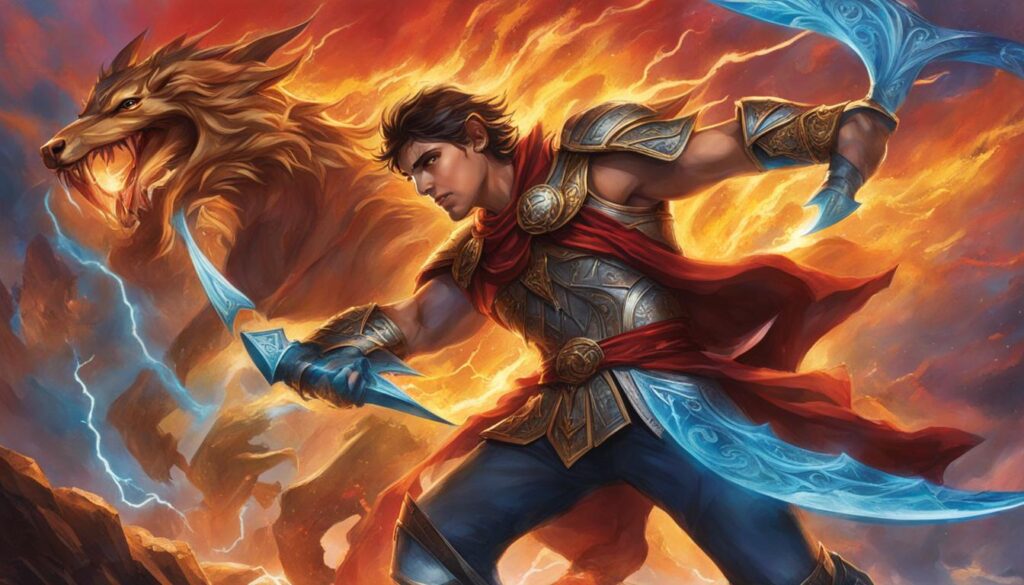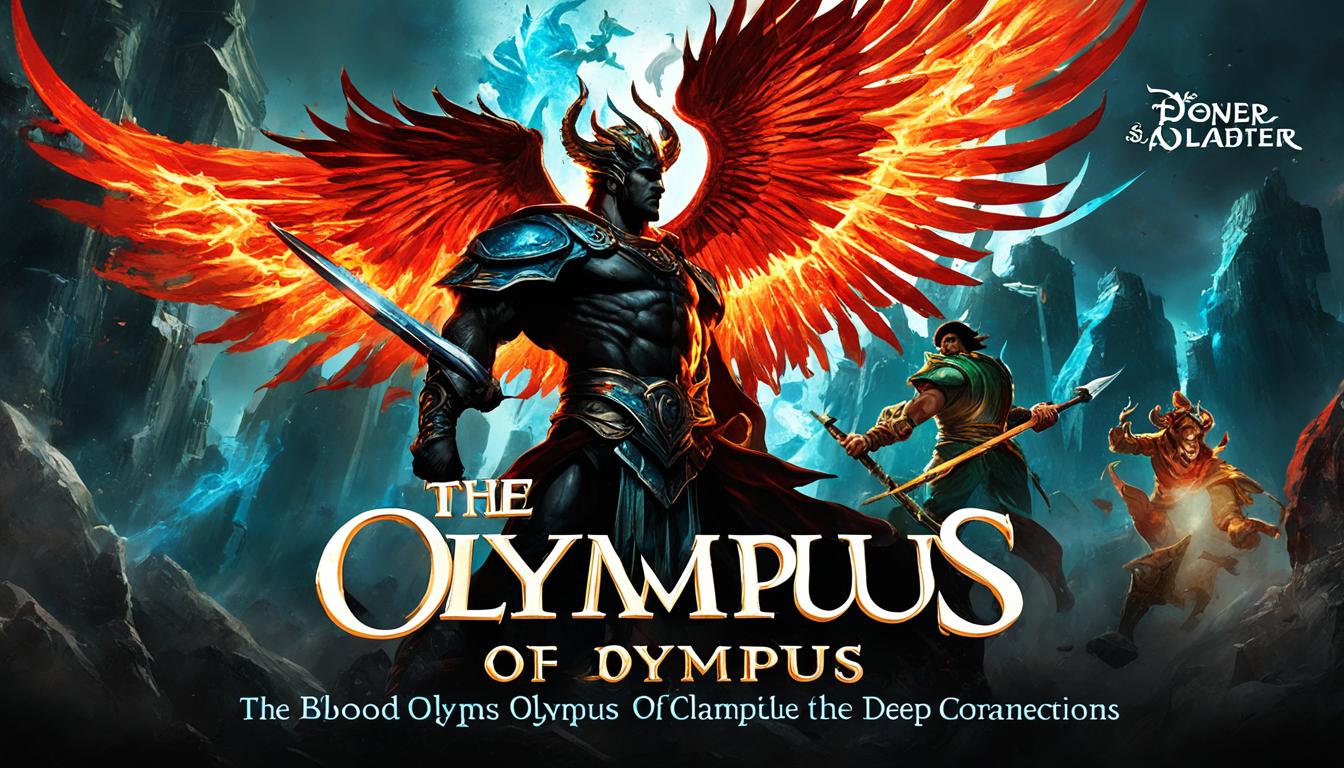If you’re a fan of mythology-based fantasies, then Rick Riordan’s name is probably already on your bookshelf. The author has gained a massive following with his best-selling series, Percy Jackson and the Olympians, and has continued to captivate readers with his masterful storytelling.
In this audiobook review, we’ll take a closer look at Riordan’s latest offering, The Blood of Olympus, the fifth and final book in the Heroes of Olympus series. We’ll explore the narration quality, character development, plot structure, and more, giving you an in-depth analysis of what you can expect from the audiobook.
Whether you’re a die-hard fan or a newcomer to Riordan’s mythological universe, this review will provide valuable insights on whether this audiobook is worth your time and attention.
About the Author
Rick Riordan is a prominent author known for his expertise in crafting engaging stories centered around mythology. Riordan has written numerous bestselling books for children and young adults, showcasing his ability to create memorable characters and immersive worlds.
Before pivoting to writing full-time, Riordan worked as a middle-school teacher where he developed a passion for introducing young readers to mythology. This experience later inspired him to write his debut novel, “The Lightning Thief,” the first in his highly acclaimed Percy Jackson and the Olympians series.
Since then, Riordan has authored several other mythologically-based series, including “The Heroes of Olympus,” of which “The Blood of Olympus” is the final installment. He has received numerous awards throughout his career, cementing his status as a top-tier author in the genre.
“Mythology has always fascinated me. From the earliest recorded civilizations, people have told stories about gods, heroes, and monsters. As a teacher, I used these stories to help my students explore ancient cultures and understand the roots of Western thought. But the stories themselves are so timeless and so powerful, I began imagining what would happen if the gods and monsters walked the earth today.”
Overview of “The Blood of Olympus”
“The Blood of Olympus” by Rick Riordan is the final book in the “Heroes of Olympus” series. The plot revolves around seven demigods who embark on a quest to save the world from Gaea, the goddess of the earth.
The book takes the readers on a thrilling journey across the United States and Greece, and introduces them to various characters from Greek and Roman mythology. The demigods must work together to overcome many obstacles, including monsters, gods, and their own personal demons, in order to stop Gaea from awakening.
The main characters include Percy Jackson, Annabeth Chase, Jason Grace, Piper McLean, Leo Valdez, Hazel Levesque, and Frank Zhang. Throughout the story, readers witness their growth and development as they overcome challenges and discover their true potential.
The book’s plot is well-paced, with a balanced mix of action, adventure, and character development. It is a fitting end to the “Heroes of Olympus” series, tying up loose ends and providing a satisfying conclusion to the overarching plot.
“The Blood of Olympus is a thrilling conclusion to an epic series, packed with action, adventure, and heart. Riordan’s skillful blend of humor and mythology will leave readers entertained and wanting more.”
Narration and Audio Experience
The “The Blood of Olympus” audiobook is a thrilling audio experience that expertly brings Riordan’s story to life. The narration by Nick Chamian is superb, as he skillfully captures the personality and emotions of each character. Chamian’s narration is clear and engaging, making it easy to follow the story and stay immersed in the world of “The Blood of Olympus.”
In addition, the audiobook features high-quality production values, with subtle sound effects and music that enhance the listening experience without being distracting. The sound effects and music are used sparingly, but they add an extra layer of depth to the story, immersing the listener in the action and emotion of the book.
The pacing of the audiobook is also well-done, allowing the story to unfold at a smooth and natural pace. The use of different voices for each character helps to distinguish them, making it easy to keep track of who is speaking. Overall, the audiobook version of “The Blood of Olympus” is a gripping and immersive audio experience that audiobook fans and fans of Rick Riordan’s works will surely enjoy.
Character Development
In “The Blood of Olympus,” Rick Riordan masterfully portrays the complex emotions, motivations, and relationships of each character, offering a rich and immersive experience for readers. The development of each character is crucial to the progression of the story, and Riordan introduces this element with precision and depth.
During the course of the audiobook, the characters face various challenges and conflicts, and these experiences shape and alter their perspectives and personalities significantly. For instance, we see Percy Jackson and Annabeth Chase grow in their relationship, facing unexpected difficulties while on their quest. In addition, other members of the demigod team, such as Nico di Angelo, undergo significant development, with the author masterfully exploring the character’s feelings and motivations.
Riordan carefully balances character development with action and plot progression, enhancing the audiobook’s overall depth and complexity. Readers experience a range of emotions while following the characters’ journeys, making for a satisfying and engaging listen.
“The character development in ‘The Blood of Olympus’ is immersive and masterfully crafted, offering readers a deep understanding of each character’s motivations and inner turmoil.” – Goodreads

Worldbuilding
One of the strongest aspects of “The Blood of Olympus” is the immersive worldbuilding crafted by Rick Riordan. Through his expert use of mythology, Riordan creates a rich and engaging setting for readers to explore.
The world of “The Blood of Olympus” is filled with gods, monsters, and magical powers, all of which are woven seamlessly into the story. Riordan’s attention to detail in crafting this mythical world is evident in the wide range of creatures and characters that populate it, each with their own history and backstory.
One particularly impressive aspect of Riordan’s worldbuilding is his ability to seamlessly incorporate elements from different mythological traditions. The book draws on Greek and Roman mythology in equal measure, and Riordan expertly weaves these two traditions together to create a cohesive and captivating world.
A World of Gods and Monsters
The gods themselves play a central role in “The Blood of Olympus,” and readers are treated to a glimpse of their complex relationships with one another. Each god has their own sphere of influence and their own set of quirks and personality traits, all of which mesh together to create a thoroughly believable and dynamic pantheon.
“I try not to think of my divinity,” Apollo said. “The simple fact that I exist, that I’m here talking to you, proves that humanity is capable of comprehending and interacting with gods.”
Alongside the gods, a variety of monsters and creatures also populate Riordan’s world. From cyclopes and gorgons to giants and chimeras, readers are never far from a battle with an otherworldly foe. Each creature is intricately described, adding to the overall richness of the world.
The Power of Myth
At its core, “The Blood of Olympus” is a story steeped in mythology. Riordan draws on a wide range of mythological traditions to create a world that feels both familiar and new. The use of myths and legends adds depth and meaning to the events of the story, and helps to create an atmosphere of epic grandeur.
Many myths are symbolic, representing universal truths that are still relevant today. Riordan expertly incorporates these symbols into the story, creating a multi-layered narrative that rewards careful reading and analysis.
Pacing and Plot
One of the strengths of “The Blood of Olympus” is its well-paced plot structure. The book balances action and character development, leading to a gripping and engaging story. The narrative flows smoothly from one scene to another, with no discernible lulls or dull moments. The action scenes are well-written and thrilling, keeping readers on the edge of their seats.
The characters’ individual storylines are threaded together seamlessly, creating a cohesive and satisfying conclusion to the series. Rick Riordan’s skillful storytelling ensures that each character’s arc is given ample attention and resolution without sacrificing the overall plot.
While some readers may find the ending somewhat predictable, the journey to that point is so well-crafted that it doesn’t detract from the book’s overall quality. Fans of the series will be delighted with the satisfying conclusion, while newcomers will appreciate the accessible and exciting narrative.
“The plot of ‘The Blood of Olympus’ was well-thought-out, with good pacing and an excellent mix of action and character development. Overall, the book was a satisfying conclusion to the series.”
– Goodreads reviewer
Themes and Symbolism
“The Blood of Olympus” by Rick Riordan is a rich and nuanced story that incorporates various themes and symbols to convey deeper messages and meanings to readers. One of the central themes explored in the book is the idea of collaboration and teamwork, as the main characters work together to face overwhelming challenges and save the world from destruction. This theme is exemplified in several scenes throughout the book, as the characters pool their skills and resources to achieve their shared goals.
Another prominent theme in “The Blood of Olympus” is the idea of sacrifice. The characters are forced to make difficult choices and give up something dear to them in order to achieve their ultimate objective. This theme highlights the inherent cost of heroism and emphasizes the importance of thinking beyond oneself for the greater good.
The use of symbolism in “The Blood of Olympus” is another highlight of the book, adding depth and layers to the narrative. One example of symbolism in the book is the representation of the gods as flawed and imperfect beings, rather than infallible and all-knowing deities. This portrayal of the gods serves as a commentary on power and hubris, highlighting the potential dangers of unchecked authority and the importance of humility and empathy in leadership.
“The Blood of Olympus” skillfully weaves together various themes and symbolism to create a dynamic and engaging reading experience that resonates with readers long after the final page.
The Importance of Themes and Symbolism
The use of themes and symbolism in “The Blood of Olympus” is an example of how literature can transcend mere entertainment to convey deeper messages and lessons to readers. By exploring universal themes such as teamwork and sacrifice and using symbolism to highlight complex ideas, Rick Riordan has created a story that resonates with readers on multiple levels and engages them in a meaningful way.
| Pros | Cons |
|---|---|
| Themes and symbolism add depth and nuance to the narrative. | The use of mythology may be confusing or off-putting to some readers. |
| The portrayal of flawed and imperfect gods offers a nuanced commentary on power and authority. | Some readers may find the multiple perspectives and storylines hard to follow. |
| The emphasis on collaboration and sacrifice highlights the importance of empathy and teamwork in achieving shared goals. | The book may feel overstuffed with characters and plotlines to some readers. |
Reception and Popularity
Since its release, “The Blood of Olympus” has garnered critical acclaim and commercial success. Rick Riordan’s loyal following and his reputation as a master storyteller have undoubtedly contributed to the audiobook’s popularity. The book has been praised for its engaging characters, intricate plot, and seamless incorporation of mythology.
According to The New York Times, the audiobook version of “The Blood of Olympus” was met with great enthusiasm from fans of the series. Its publication was accompanied by a promotional tour and extensive marketing, which helped boost its reception and popularity.
The audiobook has also received numerous awards and nominations, including the Goodreads Choice Award for Best Middle Grade & Children’s Book and the Audie Award for Best Children’s Audiobook.

The audiobook’s sales figures further demonstrate its success. As of September 2021, “The Blood of Olympus” has sold over 2 million copies worldwide. Its strong reception and popularity have cemented its status as a beloved addition to Rick Riordan’s impressive oeuvre.
Comparison to Previous Books in the Series
As the final book in the Heroes of Olympus series, “The Blood of Olympus” has a lot to live up to in comparison to its predecessors. In terms of continuity, the book provides a satisfying conclusion to the overarching storyline, tying together various plot threads and character arcs from previous books.
The evolution of the characters is also well-handled, with each member of the ensemble cast given ample opportunity to grow and change throughout the narrative. Fans of the series will be pleased to see these beloved characters come into their own and overcome their personal demons.
In terms of differences in style and tone, “The Blood of Olympus” maintains the same engaging blend of action, humor, and heart that readers have come to expect from Rick Riordan’s writing. However, the book does feel slightly more epic and weighty than previous entries in the series, with higher stakes and more dramatic confrontations.
In summary, “The Blood of Olympus” successfully compares to previous books in the series in terms of continuity, character development, and tone, while also elevating the stakes and emotional impact of the story.
Standout Moments and Memorable Scenes
“The Blood of Olympus” by Rick Riordan is filled with standout moments and memorable scenes that showcase the author’s masterful storytelling. One such moment is when spoiler alert! Reyna is revealed to have the ability to control the Mist, a powerful tool in demigod battles. This reveal not only adds depth to Reyna’s character but also opens up new possibilities for future books in the series. Another memorable scene is the final battle between the demigods and Gaea’s army at the Acropolis. This epic battle brings together characters from previous books in the series and delivers a satisfying conclusion to the story arc.
The emotional moments in “The Blood of Olympus” are also particularly memorable. One notable example is when spoiler alert! Nico di Angelo comes out to his friends about his past struggles with his sexuality. This scene highlights the importance of acceptance and support for individuals who may feel isolated or misunderstood. Another standout moment is when spoiler alert! Leo Valdez makes the ultimate sacrifice to defeat Gaea. This brave act shows the true extent of Leo’s character development throughout the series.
Overall, “The Blood of Olympus” is a thrilling and emotionally resonant audiobook that delivers on all fronts. From its well-crafted characters and intricate worldbuilding to its standout moments and memorable scenes, it is a must-read for fans of Rick Riordan’s work or the mythology genre in general.
Critical Analysis
Overall, “The Blood of Olympus” by Rick Riordan is a well-crafted audiobook that delivers on its promise of adventure, mythology, and memorable characters. Riordan’s expertise in the genre is on full display, as he seamlessly weaves together multiple storylines and characters into a cohesive whole.
The strengths of “The Blood of Olympus” are numerous, including:
- The immersive and detailed worldbuilding, which draws on Greek and Roman mythology to create a vivid and engaging setting
- The well-rounded and memorable characters, each with their own unique arcs and motivations that keep the reader invested in their journey
- The fast-paced and action-packed plot, which provides plenty of thrills and excitement without sacrificing character development
However, the audiobook is not without its flaws. One potential area for improvement is the pacing, which can feel rushed at times and may leave readers wishing for more time to fully explore certain plot points or characters.
Another aspect worth noting is that “The Blood of Olympus” may not be as accessible to readers who are unfamiliar with Riordan’s previous works or Greek/Roman mythology. While Riordan does a good job of providing context and explanations as needed, readers may feel lost in the midst of the many characters and plot threads if they don’t have a baseline understanding of the series’ established mythology.
Despite these minor quibbles, “The Blood of Olympus” remains a highly engaging and enjoyable audiobook that will appeal to fans of the series and newcomers alike. Riordan’s skillful storytelling and rich imagination are on full display, making for a journey that is both thrilling and memorable.
Reader Recommendations
For fans of Rick Riordan’s previous works or anyone looking for an immersive and action-packed mythological adventure, “The Blood of Olympus” audiobook is a must-listen. The book is particularly recommended for young adult readers interested in mythology and the genre of adventure fantasy.
The detailed worldbuilding and intricate character development make this audiobook a standout choice for those seeking a rich and immersive experience. It is also a great pick for fans of audiobooks with great narration, as Jesse Bernstein’s performance brings the story and its characters to life.
“I loved ‘The Blood of Olympus’ audiobook. As a fan of Rick Riordan’s work, this book did not disappoint. The characters were well-developed, and the story had me on the edge of my seat till the very end.” – Amazon Review
Conclusion
Overall, “The Blood of Olympus” by Rick Riordan proves to be a thrilling and immersive audiobook experience. The expert narration and well-crafted sound effects enhance the story, drawing listeners into the world of Greek mythology.
The character development is top-notch, with the main protagonists exhibiting genuine growth and depth throughout the book. Moreover, the worldbuilding is rich and captivating, with Rick Riordan seamlessly weaving mythology into the story.
The pacing and plot structure are effective, balancing action and character development to create a well-rounded narrative. The themes and symbolism present in the book carry important messages, adding depth and meaning to the story.
Overall, “The Blood of Olympus” receives high marks for its critical analysis. While there are potential areas for improvement, the book’s strengths far outweigh any weaknesses. This audiobook is highly recommended to anyone looking for a thrilling and engaging story in the mythology genre.
In conclusion, “The Blood of Olympus” is an exceptional audiobook that offers an incredible listening experience. Rick Riordan has once again proven himself to be a master storyteller, and this audiobook is a testament to his skill and expertise. Whether you are a die-hard fan of the author or are new to the mythology genre, this audiobook is sure to leave a lasting impression on you.



